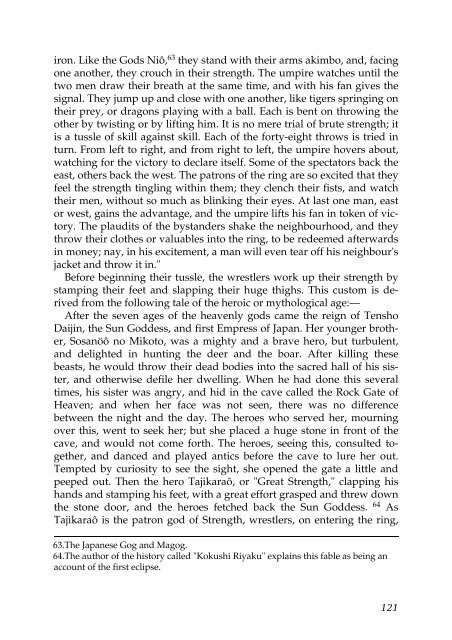Create successful ePaper yourself
Turn your PDF publications into a flip-book with our unique Google optimized e-Paper software.
iron. <strong>Like</strong> the Gods Niô, 63 they stand with their arms akimbo, and, facing<br />
one another, they crouch in their strength. The umpire watches until the<br />
two men draw their breath at the same time, and with his fan gives the<br />
signal. They jump up and close with one another, like tigers springing on<br />
their prey, or dragons playing with a ball. Each is bent on throwing the<br />
other by twisting or by lifting him. <strong>It</strong> is no mere trial <strong>of</strong> brute strength; it<br />
is a tussle <strong>of</strong> skill against skill. Each <strong>of</strong> the forty-eight throws is tried in<br />
turn. From left to right, and from right to left, the umpire hovers about,<br />
watching for the victory to declare itself. Some <strong>of</strong> the spectators back the<br />
east, others back the west. The patrons <strong>of</strong> the ring are so excited that they<br />
feel the strength tingling within them; they clench their fists, and watch<br />
their men, without so much as blinking their eyes. At last one man, east<br />
or west, gains the advantage, and the umpire lifts his fan in token <strong>of</strong> victory.<br />
The plaudits <strong>of</strong> the bystanders shake the neighbourhood, and they<br />
throw their clothes or valuables into the ring, to be redeemed afterwards<br />
in money; nay, in his excitement, a man will even tear <strong>of</strong>f his neighbour's<br />
jacket and throw it in."<br />
Before beginning their tussle, the wrestlers work up their strength by<br />
stamping their feet and slapping their huge thighs. This custom is derived<br />
from the following tale <strong>of</strong> the heroic or mythological age:—<br />
After the seven ages <strong>of</strong> the heavenly gods came the reign <strong>of</strong> Tensho<br />
Daijin, the Sun Goddess, and first Empress <strong>of</strong> <strong>Japan</strong>. Her younger brother,<br />
Sosanöô no Mikoto, was a mighty and a brave hero, but turbulent,<br />
and delighted in hunting the deer and the boar. After killing these<br />
beasts, he would throw their dead bodies into the sacred hall <strong>of</strong> his sister,<br />
and otherwise defile her dwelling. When he had done this several<br />
times, his sister was angry, and hid in the cave called the Rock Gate <strong>of</strong><br />
Heaven; and when her face was not seen, there was no difference<br />
between the night and the day. The heroes who served her, mourning<br />
over this, went to seek her; but she placed a huge stone in front <strong>of</strong> the<br />
cave, and would not come forth. The heroes, seeing this, consulted together,<br />
and danced and played antics before the cave to lure her out.<br />
Tempted by curiosity to see the sight, she opened the gate a little and<br />
peeped out. Then the hero Tajikaraô, or "Great Strength," clapping his<br />
hands and stamping his feet, with a great effort grasped and threw down<br />
the stone door, and the heroes fetched back the Sun Goddess. 64 As<br />
Tajikaraô is the patron god <strong>of</strong> Strength, wrestlers, on entering the ring,<br />
63.The <strong>Japan</strong>ese Gog and Magog.<br />
64.The author <strong>of</strong> the history called "Kokushi Riyaku" explains this fable as being an<br />
account <strong>of</strong> the first eclipse.<br />
121



